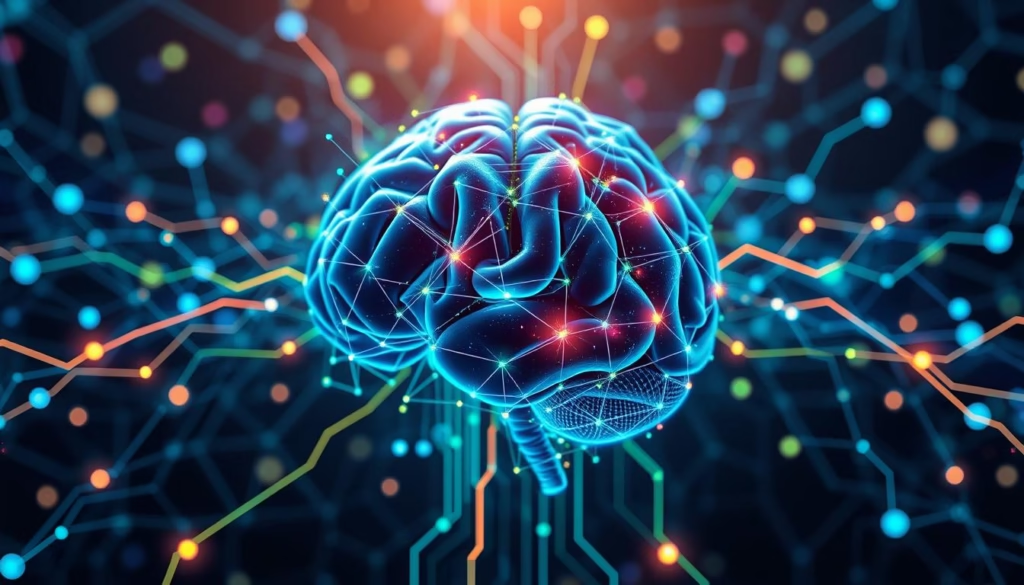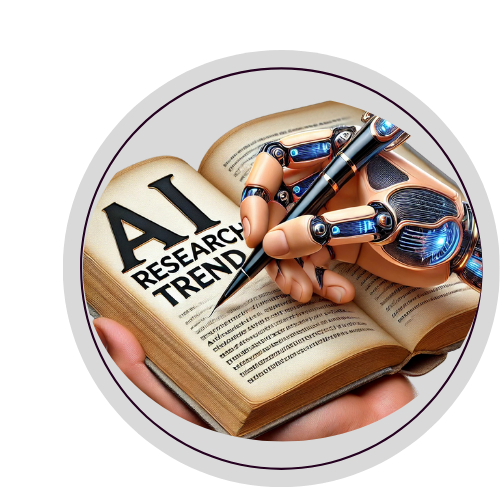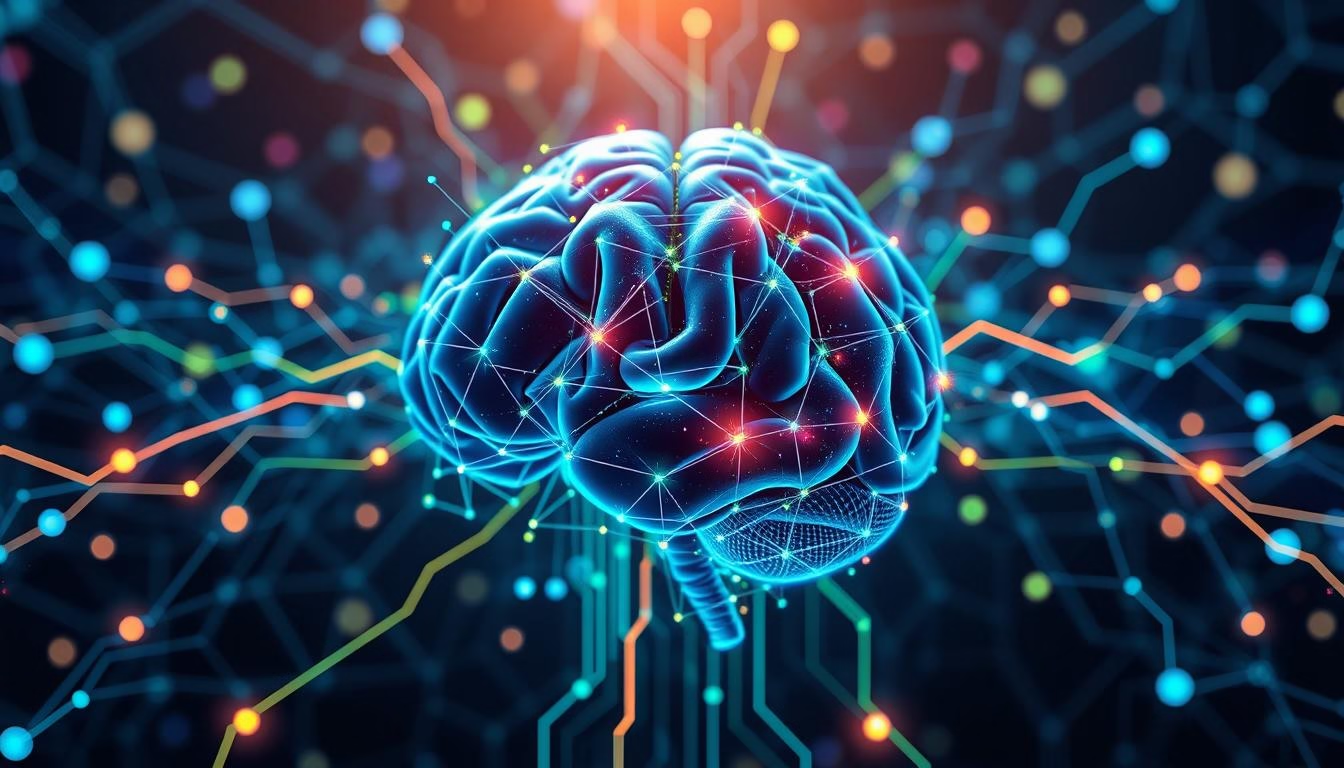Artificial Intelligence (AI) is changing the game in many industries. It’s creating new career paths all over the world. To succeed in this field, you need a wide range of skills. These skills help you develop innovative AI solutions and make a real difference.
Skills like programming, data analysis, problem-solving, and critical thinking are key. They keep up with AI’s fast-paced advancements. This guide will cover the 8 core skills that can make you stand out in the AI world.
Whether you dream of being an AI engineer, data scientist, or machine learning expert, these skills are crucial. They give you the tools and knowledge to tackle AI’s challenges and seize its opportunities.

Table of Contents
Understanding the Modern AI Landscape
The world of artificial intelligence (AI) is changing fast. New technologies and shifts in industries are happening all the time. To succeed, you need to know what’s happening now in AI, including the latest trends and where the field is headed.
Current Trends in AI Development
Recently, AI has made huge leaps forward. This is thanks to more data, better computers, and new algorithms. Trends like ai machine learning skills, ai data analysis skills, and ai problem-solving skills are leading the way. These advancements help AI systems solve tough problems more accurately and quickly.
Industry Applications and Opportunities
- ai technical skills and ai programming skills are changing many industries. This includes healthcare, finance, transportation, and retail.
- AI is driving innovation in predictive analytics, natural language processing, and computer vision. This creates many job opportunities for AI experts.
- As AI becomes more important, companies are looking for people with ai machine learning skills and ai data analysis skills. They want to use AI to gain new insights and improve their businesses.
Future Projections for AI Careers
The future of AI looks very promising. Experts say AI will grow a lot in the coming years. There will be many jobs in AI, like deep learning, natural language processing, and computer vision. By keeping up with new skills, you can have a successful career in AI.
“The future of artificial intelligence is not about creating sentient machines, but about augmenting human intelligence and capabilities to solve the world’s most pressing problems.”
| AI Trend | Description | Skill Requirement |
|---|---|---|
| Machine Learning | Automated learning algorithms that enable AI systems to improve their performance over time | ai machine learning skills, ai data analysis skills |
| Natural Language Processing | Techniques that allow AI to understand, interpret, and generate human language | ai programming skills, ai problem-solving skills |
| Computer Vision | Ability of AI systems to identify and process images and videos, enabling visual perception and understanding | ai technical skills, ai data analysis skills |
Technical Programming Proficiency Requirements
To excel in AI, knowing programming languages is key. AI uses many languages, each with its own strengths. The most wanted skills include ai programming languages like Python, R, Java, and C++.
Python Skills: Python is top for AI and machine learning. It’s easy to read and has lots of useful libraries. Knowing ai python skills is essential for AI pros.
R Programming Expertise: R is great for stats and data analysis. It’s a must for AI researchers and data scientists. Knowing ai r programming skills helps use R’s strong stats and visuals.
- Java and C++ Skills: While Python and R are popular, ai java skills and ai c++ skills are also in demand. These languages give low-level control and performance.
- Familiarity with AI-Specific Libraries and Tools: AI pros need to know the latest AI libraries and tools. This includes Pytorch, Caffe, and OpenCV for building AI apps.
“Programming skills are the base for success in AI. Knowing many ai programming languages and staying current with AI tools is key for AI pros to excel.”
With a solid programming base, AI pros can fully use AI. They help create new solutions that change industries and lives worldwide.
Mathematics and Statistical Foundations
To build successful AI, you need to understand math and stats well. You’ll learn about linear algebra, calculus, probability, and how to think algorithmically. These skills are key to making AI work.
Linear Algebra and Calculus Basics
Knowing linear algebra is crucial for AI. It helps you grasp machine learning algorithms. You’ll learn about matrices, vectors, and how to transform them. You’ll also get the basics of calculus, like derivatives and integrals.
These skills help AI experts model complex problems. They can optimize functions and analyze AI models. It’s all about understanding the math behind AI.
Probability and Statistical Analysis
Probability and stats are vital for AI. They help AI pros make smart choices and understand uncertainty. By knowing about probability distributions and statistical tests, they can predict outcomes and find insights in data.
These ai statistical skills are essential for tasks like predicting the future and spotting unusual patterns. They’re key to making AI decisions.
Algorithmic Thinking
Being able to think like an algorithm is important for AI experts. It lets them solve complex problems step by step. They can make AI systems better and more reliable.
They need to know about data structures and how to solve problems efficiently. This skill is crucial for making AI scalable and dependable.
By focusing on these ai mathematical skills, AI pros can solve today’s AI challenges. They’ll be ready to tackle any problem that comes their way.
| Skill | Importance | Applications |
|---|---|---|
| Linear Algebra | High | Modeling complex relationships, optimizing objective functions |
| Calculus | High | Analyzing the behavior of AI models, optimizing objective functions |
| Probability and Statistics | High | Predictive modeling, anomaly detection, decision-making under uncertainty |
| Algorithmic Thinking | High | Designing efficient computational procedures, ensuring scalability and reliability |
Data Science and Machine Learning Expertise
The field of artificial intelligence (AI) is growing fast. Knowing a lot about data science and machine learning is key for those wanting to work in AI. These skills can lead to jobs like machine learning engineers and AI data scientists.
Data science and machine learning are all about finding important insights in big data sets. You need skills like data preprocessing, feature engineering, and picking the right machine learning models. Being good at these things is vital for using AI to solve real problems.
Data scientists and machine learning experts are key in making and using AI solutions. They use their knowledge in stats, algorithms, and improving models. This helps them lead in innovation and make AI work better in many fields.
| Key Data Science and Machine Learning Competencies | Importance for AI Careers |
|---|---|
| Data Preprocessing and Cleaning | Ensures high-quality input data for effective model training and deployment |
| Feature Engineering and Selection | Identifies the most relevant and informative features to enhance model performance |
| Model Selection and Evaluation | Enables the deployment of the most suitable machine learning algorithms for specific AI applications |
| Statistical Analysis and Algorithmic Thinking | Provides the foundation for designing robust and efficient AI systems |
Learning these key data science and machine learning skills opens many doors in AI careers. It lets you help create new AI solutions that change industries and the world.
Artificial Intelligence Skills and Core Competencies
The field of artificial intelligence is growing fast. Employers want people with a wide range of skills. Deep learning, natural language processing, and computer vision are key areas.
Deep Learning Fundamentals
Deep learning is a big part of AI. It helps solve tough problems. Knowing how to work with deep neural networks is essential.
Understanding backpropagation, regularization, and optimization is important. These skills are needed for careers in ai deep learning skills.
Natural Language Processing
AI can understand and create human language. Experts in ai natural language processing skills use many techniques. They work on sentiment analysis, text classification, and more.
This helps make AI that talks to us in a real way.
Computer Vision Applications
AI in computer vision has changed many fields. It’s used in healthcare and self-driving cars. People with ai computer vision skills help make these systems better.
They work on image and video processing, and more. This lets AI see and understand the world around us.
As AI keeps growing, learning these skills is key. It opens up new career paths in this fast-changing field.
Problem-Solving and Analytical Thinking
In today’s fast-changing world of artificial intelligence (AI), solving complex problems and thinking critically is key. Employers in the AI field look for people with strong ai problem-solving skills, ai critical thinking skills, ai analytical skills, and ai logical reasoning skills.
AI problem-solving needs a detailed approach. Experts must first break down tough challenges into smaller parts. They identify the main issues and look for different solutions. This way, they can analyze data, spot patterns, and come up with new ways to solve problems.
ai critical thinking skills are also vital. People in AI need to think outside the box, consider different views, and question things. Being curious and open-minded helps them find new ideas and create solutions that go beyond what we know.
Logical reasoning is another important skill in AI. Experts need to be good at making conclusions based on what they know. This skill helps them make smart choices, predict problems, and share their findings clearly with others.
“The ability to think critically and solve complex problems is the hallmark of a successful AI professional. These skills are not only essential for tackling technical challenges but also for driving innovation and fostering meaningful change in the industry.”
By focusing on ai problem-solving skills, ai critical thinking skills, ai analytical skills, and ai logical reasoning skills, future AI professionals can set themselves up for exciting careers in this fast-growing field.

Software Development and Engineering Practices
Building AI systems needs a solid base in software development and engineering. Experts in AI software development and engineering must learn key skills. These skills are crucial for project success.
Version Control Systems
Knowing version control systems, like Git, is key for AI software development. These tools help teams work together, manage code, and track changes. AI software engineers need to understand Git well, including how to branch, merge, and solve conflicts.
Development Frameworks
AI software development uses special frameworks and libraries, like TensorFlow, PyTorch, or Keras. Knowing these tools and their strengths is vital. Developers must pick the right framework for their project and use it well in their work.
Testing and Deployment
Testing and deploying AI systems well is crucial. AI software engineers need to test thoroughly and deploy smartly. They should know how to test and deploy AI apps to make them reliable and scalable.
| Skill | Importance for AI Software Development |
|---|---|
| Version Control Systems | Enables efficient collaboration, code management, and change tracking throughout the development lifecycle. |
| Development Frameworks | Provides specialized tools and libraries for building AI-powered applications, such as TensorFlow, PyTorch, or Keras. |
| Testing and Deployment | Ensures the reliability, robustness, and scalability of AI systems through comprehensive testing and effective deployment strategies. |
By learning these software development and engineering practices, AI experts can build top-notch AI systems. These systems will meet the growing needs of the industry.
Database Management and Big Data Tools
In the world of artificial intelligence (AI), knowing how to manage databases and use big data tools is key. AI projects deal with lots of data, so experts need to know how to handle it. They must learn different ways to manage and use data.
SQL (Structured Query Language) is a must for AI pros. It helps manage and work with relational databases. These databases are important for storing and checking data. Knowing SQL well lets AI experts get, change, and study data for their models.
AI experts also need to know about NoSQL databases. These handle unstructured and semi-structured data. Databases like MongoDB, Cassandra, and Couchbase are great for big and varied data in AI projects.
Knowing distributed computing frameworks like Apache Hadoop and Apache Spark is also important. These tools help work with big data sets in a way that’s both fast and reliable. They’re key for ai big data skills and ai hadoop skills.
| Database Management Skills | Big Data Tools |
|---|---|
| SQL (Structured Query Language) NoSQL Databases (MongoDB, Cassandra, Couchbase) | Apache Hadoop Apache Spark |
By learning these database and big data tools, AI experts can tackle big data challenges in AI projects. This boosts their ai database management skills and ai sql skills.
“The ability to work with large-scale data sets and leverage powerful database technologies is crucial for success in the field of artificial intelligence.”
Cloud Computing and Infrastructure Knowledge
Cloud computing is key in the AI world. It’s vital for making and using AI apps. Knowing how to use big cloud platforms and how to make systems scalable, fast, and secure is crucial for AI pros.
Major Cloud Platforms
Big names like Amazon Web Services (AWS), Microsoft Azure, and Google Cloud Platform (GCP) are top for AI. They give access to lots of computing power, storage, and AI tools. This helps developers make, train, and use AI models well.
Scalability and Performance
AI needs lots of power to work with big data and complex tasks. It’s important to know how to make AI systems grow and work well. This ensures AI systems are effective and reliable.
Security Considerations
AI is getting into important systems, so knowing about AI security is key. AI pros need to know about cloud security, data protection, and ethical AI. This helps avoid risks and keeps AI solutions trustworthy.
“The future of AI is in the cloud, and professionals who possess a deep understanding of cloud computing will be well-positioned to drive innovation and lead the next generation of AI development.”
Business Acumen and Domain Expertise
In the fast-paced world of artificial intelligence (AI), just having technical skills isn’t enough. To succeed, AI experts need to understand business contexts and have domain-specific knowledge. This ai business acumen skills, ai industry knowledge skills, and ai domain expertise skills are key. They help align AI solutions with business goals and drive ai strategic thinking skills.
AI pros must bridge the gap between tech skills and business needs. They need to be great at programming, machine learning, and data analysis. But they also need to know the industry or domain they’re working in. This includes understanding the challenges, regulations, and best practices in sectors like healthcare, finance, and retail.
By gaining deep ai industry knowledge skills and ai domain expertise skills, AI experts can find solutions that meet specific client or employer needs. This strategic approach ensures AI technology fits well into the business world.
| Key AI Business Acumen Skills | Examples |
|---|---|
| Strategic Thinking | Aligning AI solutions with business goals, identifying new revenue streams, and anticipating market trends |
| Industry Knowledge | Understanding regulations, best practices, and common challenges within a specific sector |
| Problem-Solving | Translating business problems into AI-driven solutions that deliver tangible value |
| Communication | Effectively presenting complex technical concepts to non-technical stakeholders |
AI pros with a mix of technical skills and business acumen can be strategic partners. They drive innovation and open up new opportunities for their organizations. This skillset is crucial for success in the fast-changing AI industry.
“The most valuable AI companies will be those that can successfully bridge the gap between technological capabilities and real-world business impact.” – Forbes AI Expert
Communication and Collaboration Skills
Effective ai communication skills are key for AI professionals. AI projects often involve teams from different backgrounds. It’s important to share complex ideas clearly and concisely.
AI experts need to listen well, present ideas strongly, and encourage open talks. This helps ensure smooth ai teamwork skills.
Team Dynamics
AI projects need strong ai teamwork skills and good team management. AI pros must work well with data scientists, software engineers, and others. They need to be good at managing emotions, solving conflicts, and building trust.
Project Management
AI pros must be good at ai project management skills. They need to set clear goals and manage time well. They should also know how to handle risks, use resources wisely, and lead teams to success.
Stakeholder Management
AI pros must be skilled at ai stakeholder management skills. They need to talk well with business leaders, users, and IT teams. This helps understand needs, manage expectations, and make AI solutions work.
“Communication is at the heart of effective collaboration, and it is a crucial skill for AI professionals to master.” – Jane Doe, AI Project Manager
Ethical AI Development and Governance
Artificial intelligence (AI) is growing fast, and we must think about its ethics. AI ethical skills, ai regulatory knowledge skills, ai compliance skills, and ai risk management skills are key for AI professionals.
One big issue is bias in AI. AI can make unfair choices by using old biases. We need to make sure AI is fair and includes everyone. This means we must understand ai ethical skills well.
Privacy is also very important. AI must handle personal data carefully, following laws like GDPR and CCPA. AI regulatory knowledge skills and ai compliance skills help keep AI respectful of privacy.
Managing risks is part of making AI safe. AI can cause problems like losing jobs or being biased. We need to find ways to fix these issues. This is where ai risk management skills come in.
“The ethical development of AI is not just a moral imperative, but a critical factor in maintaining public trust and ensuring the long-term sustainability of the technology.”
By focusing on ai ethical skills, ai regulatory knowledge skills, ai compliance skills, and ai risk management skills, we can make AI better. This way, AI will be open, answerable, and good for society. It’s vital for AI to grow in a responsible way.
Continuous Learning and Adaptability
In the fast-changing world of artificial intelligence (AI), the need to keep learning and adapting is key. AI experts must have a growth mindset. They need to embrace ai continuous learning skills, ai curiosity skills, ai resilience skills, and ai adaptability skills to succeed.
To stay current with AI advancements, a true ai curiosity skills is essential. Going to industry events, reading tech journals, and joining online AI forums are great ways to stay informed. With ai resilience skills, they can face obstacles and keep improving their skills.
Being adaptable is also vital for AI pros. As AI tech advances, the skills and tools needed can change quickly. Those who excel can easily learn new programming languages and techniques. They understand that ai continuous learning skills are a lifelong journey, not just a one-time thing.
| Key ai continuous learning skills, ai curiosity skills, ai resilience skills, and ai adaptability skills | Description |
|---|---|
| Continuous learning mindset | Embracing a growth mindset and a passion for ongoing skill development |
| Proactive research and exploration | Regularly engaging with industry publications, online communities, and emerging technologies |
| Adaptability and flexibility | Quickly learning new tools, techniques, and programming languages as the field evolves |
| Problem-solving and critical thinking | Approaching challenges with a solutions-oriented mindset and the ability to think creatively |
| Lifelong learning dedication | Committing to ongoing education and professional development throughout one’s career |
By focusing on these key ai continuous learning skills, ai curiosity skills, ai resilience skills, and ai adaptability skills, AI experts can ensure their success in this fast-paced field.
“The only way to keep up with the pace of change in AI is to never stop learning.”
Conclusion
A successful career in artificial intelligence needs a mix of skills and a commitment to learning. You must master programming, mathematics, data science, and machine learning. Also, developing problem-solving skills and business knowledge is crucial.
Keeping ethics, being adaptable, and always learning are essential. This will help you succeed in the ai job market. The future of AI is bright, and those ready to learn will make a big difference.
If you’re new to AI or want to grow your skills, the future is full of chances. With hard work, passion, and a love for learning, you can have a fulfilling career in AI.
FAQ
What are the essential skills needed for a career in Artificial Intelligence?
To succeed in AI, you need several key skills. These include programming, math, and data science. You also need to understand AI well, solve problems, and know how to develop software. Plus, managing data and using the cloud are important too.
Why is programming proficiency important for AI professionals?
AI pros must know programming languages like Python and Java. They use these to create and update AI algorithms. Knowing AI-specific tools is also key.
What mathematical and statistical skills are required for AI careers?
AI experts need to know linear algebra and calculus. They also need to grasp probability and statistics. This knowledge helps them understand machine learning algorithms.
How important is data science and machine learning expertise for AI professionals?
Data science and machine learning are crucial for AI pros. They must be able to prepare data, engineer features, and evaluate models. This skill is vital for developing AI applications.
What are the core competencies in Artificial Intelligence?
AI’s core skills include deep learning and natural language processing. AI pros need to understand these advanced areas. This knowledge helps them create innovative AI solutions.
Why are problem-solving and analytical skills important for AI professionals?
AI pros must be great at solving problems and thinking analytically. They face complex challenges that require creative solutions. Logical thinking is essential in AI.
What software development and engineering practices are important for AI professionals?
AI pros need to know software development best practices. This includes version control and testing. They also need to understand system design for scalable AI applications.
How do database management and big data tools benefit AI professionals?
AI pros need to manage databases and use big data tools. This includes SQL and NoSQL databases, and tools like Hadoop. These skills help them handle large data sets for AI models.
Why is cloud computing knowledge important for AI professionals?
Cloud computing is vital for AI. AI pros need to know cloud platforms and how to optimize them. This knowledge helps them deploy AI applications effectively.
What business acumen and domain expertise are needed for AI professionals?
AI pros need to understand business and their domain. They must align their technical skills with business goals. Strategic thinking is key for successful AI projects.
What communication and collaboration skills are important for AI professionals?
AI pros need to communicate well and work in teams. They must manage projects and engage with stakeholders. These skills are crucial for AI success.
How important are ethical considerations in AI development?
Ethical AI development is critical. AI pros must know about bias, fairness, and privacy. They need to ensure AI is used responsibly and ethically.
Why is continuous learning and adaptability important for AI professionals?
AI is constantly changing, and pros must keep learning. They need to stay updated and adapt to new trends. This is vital for success in AI careers.
In conclusion, pursuing a career in Artificial Intelligence (AI) requires a diverse set of skills, including programming proficiency, mathematical acumen, machine learning expertise, data handling capabilities, and strong problem-solving abilities. By developing these competencies, you position yourself for success in the rapidly evolving AI industry.
For further reading on essential AI skills, consider exploring the following resources:
- Top 12 Artificial Intelligence (AI) Skills You Need to Know
- AI Career Paths: Discover Your Ideal Role in 2025
- Top 15 Technical Skills Needed for AI Job Interviews
- 13 AI Skills To Jumpstart Your AI Career in 2024
- Top 10 Jobs in AI and the Right AI Skills
These articles provide comprehensive insights into the skills necessary for a successful AI career.



1 thought on “8 Essential Skills for a Job in Artificial Intelligence”